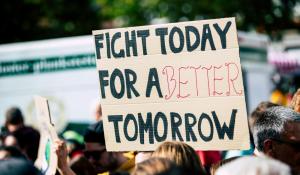
When people of color lack access to financial services, their schools, housing, and businesses are affected. Delegate Jazz Lewis of Maryland details the economic repercussions for constituents like his.
As the global pandemic disproportionately affected communities of color and activists took to the streets following the police killing of George Floyd in the summer of 2020, national attention turned to enduring systemic racism in American society. Among the many challenges facing Black Americans, Black communities are drastically underserved economically, and Black families lag far behind white families in terms of wealth, a phenomenon known as the “racial wealth gap.”
Despite the gains of the Civil Rights Movement, a 2020 report by Citibank on the racial wealth gap and its enduring effects found that the gaps in “unemployment, net worth, debt levels, wages, peak income, financing for businesses, [and] spending on education” are higher than ever.
The Economic Costs of Racism
To learn more about the economic costs of racism, including how racism doesn’t just harm individuals but the economy as a whole, I spoke with Delegate Jazz Lewis, who represents the 24th Legislative District (Prince George's County) in Maryland’s House of Delegates. Lewis recently wrote an article for the Brookings Institute about how states can help close the racial wealth gap and has worked with Maryland pension funds to increase diversity in management teams to ensure more equitable investments. Prior to his work in the legislature, Lewis worked as a community organizer for the Service Employees International Union in 2011 and 2012 and helped ensure consumer protections for Baltimore City residents. In our interview, he spoke about how racism and racial inequality holds all of our people and our economy back, as well as how people are working to close the gaps. This interview was edited for length and clarity.
Green America/Asher Weinstein: What do you see as the economic costs of racism for the country and our society, and why?
Del. Jazz Lewis: I worked as a community organizer on the streets of Baltimore. And a lot of my experience there taught me that if you give small businesses and minority-owned businesses, an opportunity, they’re going to hire the people who live in their communities. But they aren’t always getting those opportunities, and that has pretty far-reaching effects. The Citi report showed that because of inequities in who gets approved for housing and other elements of the wealth gap, [the US economy] was missing out on about $16 trillion worth of economic activity over 20 years.
This is because these issues are disproportionately hurting the African-American community, and because of that, the negative effect spreads beyond just the businesses and people who didn’t get loans or assistance. That’s because those are jobs that people could have had, not just within the African-American community, but whoever they would have hired, and the stuff that they could have purchased.
Green America: Speaking of access to credit and wealth, in your Brookings article, you highlight that community development financial institutions (CDFIs) and local credit unions outperform megabanks in giving loans and credit to minority and low-income communities. Why is that, and how did it affect communities of color during the covid-19 crisis? According to a paper in the National Bureau of Economic Research, the first round of PPP funds “was disproportionately disbursed to non-minority communities.”
In his Brookings article, Lewis suggests establishing a state-run “domestic emerging market fund manager, a person more likely to invest and allocate capital in non-traditional low income urban and rural communities, to increase the flow of capital to minorities.”
Lewis: One of the big reasons that traditional lenders don’t help minority-owned businesses is the corporate consolidations of these megabanks, which has meant that their underwriting costs (costs for the lender) for a loan are the same, regardless of if it’s a $50,000 loan or a million-dollar loan. From a business standpoint, you’re going to try to have your staff spending all their time on the higher-end loans instead of the low-dollar loans.
Unfortunately, we’re seeing fewer and fewer community banks, which are the bread and butter for a lot of these smaller Black-owned businesses.
And during covid-19 specifically, we noticed that in the later rounds, a number of minorities weren’t able to get their PPP loans when they needed them most. And as a result, 41 percent of businesses that closed during the pandemic were Black-owned, despite only making up only 3 percent of all the businesses in the US. In addition to no longer being able to hire people, these small business owners are major figures in their community, so you can imagine the impact that’s gonna have on those communities.
Green America: In addition to ensuring access to lenders, you’ve been working to improve diversity in Maryland’s pension funds. How can lawmakers and individuals put pressure on these pensions, as well as lending institutions to improve their practices?
Lewis: We can tell pension funds and other institutional investors that their guidelines should require them to have diverse fund managers, because they tend to be under-capitalized (lack sufficient funding to conduct regular fund operations), but they over-perform compared to their counterparts.
As Lewis points out in his Brookings article, in 2018, “minority-owned equity firms represented 34 percent of the top quintile of performers but managed less than 1 percent of available capital.”
We can put pressure on them because they should have a policy requiring diverse fund managers to begin with. You can also tell funds they need to set some percentage of their investments set aside for non-traditional investments, because of the larger growth potential of the societal impact. After all, if a minority-run and a non-minority fund would invest in the exact same things, you’re not expanding equity or addressing racial wealth inequality.
Asher Weinstein is a former communications and editorial intern for Green America and is currently pursuing a Masters of Public Policy at American University.







